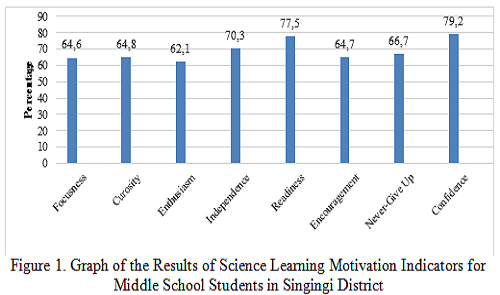
Analysis of Learning Motivation of Junior Hight School Students in Terms of the use of Digital Platforms in Online Learning
Abstract
Keywords
Full Text:
PDFReferences
Arikunto, S. (2012). Dasar-dasar evaluasi pendidikan edisi 2. Jakarta: Bumi Aksara.
Aryasuta, I. W. E., Suparta, I. N., & Suweken, G. (2014). Pengaruh model pembelajaran berbasis masalah dengan media pembelajaran berbantuan geogebra terhadap prestasi belajar matematika siswa ditinjau dari tingkat ketangguhan siswa. Jurnal jurusan pendidikan matematika ganesha, 3(1), 1-9.
Aviana, R., & Hidayah, F. F. (2015). Pengaruh Tingkat Konsentrasi Belajar Siswa terhadap Daya Pemahaman Materi pada Pembelajaran Kimia di SMA Negeri 2 Batang. Jurnal Pendidikan Sains (JPS), 3(1), 30-33.
Dwi, B., Amelia, A., Hasanah, U., & Putra, A. M. (2020). Analisis Keefektifan Pembelajaran Online di Masa Pandemi Covid-19. Jurnal Pendidikan Guru Sekolah Dasar, 2(1), 28–37.
Effendi, E., Mursilah, M., & Mujiono, M. (2018). Korelasi Tingkat Perhatian Orang Tua dan Kemandirian Belajar dengan Prestasi Belajar Siswa. Titian Ilmu: Jurnal Ilmiah Multi Sciences, 10(1), 17–23.
Emda, Amna.( 2018.)Kedudukan motivasi belajar siswa dalam pembelajaran. Lantanida Journal 5(2), 172–182.
Firman, & Rahman, S. R. (2020). Pembelajaran Online di Tengah Pandemi Covid-19 Firman1, Sari Rahayu Rahman1. Indonesian Journal of Educational Science (IJES), 2(2), 81–89.
Fitriyani, Y., Fauzi, I., & Sari, M. Z. 2020. Motivasi belajar mahasiswa pada pembelajaran daring selama pandemik covid-19. Jurnal Kependidikan: Jurnal Hasil Penelitian dan Kajian Kepustakaan di Bidang Pendidikan, Pengajaran dan Pembelajaran, 6(2), 165-175.
Hidayat, D. R., Rohaya, A., Nadine, F., & Ramadhan, H. (2020). Kemandirian Belajar Peserta Didik Dalam Pembelajaran Daring Pada Masa Pandemi Covid -19. Perspektif Ilmu Pendidikan, 34(2), 147– 154.
Horzum, M. B., Kaymak, Z. D., & Gungoren, O. C. (2015). Structural equation modeling towards online learning readiness, academic motivations, andperceived learning.Educational Sciences: Theory & Practice, 15(3), 759-770.
Ibrahim, D. S., & Suardiman, S. P. (2014). Pengaruh Penggunaan E-Learning Terhadap Motivasi dan Prestasi Belajar Matematika Siswa SD Negeri Tahunan Yogyakarta. Jurnal Prima Edukasia, 2(1), 66.
Juliya, M., & Yusuf, T, H. 2021. Analisis Problematika Pembelajaran Daring dan Pengaruhnya Terhadap Motivasi Belajar Siswa. Genta Mulia, 12(1), 281-294.
Kriyantono, R. (2006). Teknik Riset Komunikasi. PT. Raja Grafindo Persada Jakarta. jakarta.
Kusuma, A. B., Astuti, W., & Setyawan, C. E. 2019. Analisis Penerapan Media Pembelajaran Bahasa Arab Berbasis Aplikasi Google Classroom di Sekolah Tinggi Agama Islam Masjid Syuhada (STAIMS) Yogyakarta. Al-Manar, 8(2), 151-180.
Maulah, S., Nurul, A. F. & Ummah, N. R. 2020. Persepsi Mahasiswa Biologi Terhadap Perkuliahan Daring Sebagai Sarana Pembelajaran Selama Pandemi Covid-19. ALVEOLI: Jurnal Pendidikan Biologi, 1(2), 49-61.
Mayasari, F. D. (2017). Pengaruh Konsentrasi Belajar dan Motivasi Belajar Terhadap Hasil Belajar Siswa SI SMK Negeri 1 Ngabang. Jurnal Pendidikan Dan Pembelajaran Khatulistiwa, 6(6), 1–11.
Mohatashami, A. R., Tajari, F., & Rad, M. R. A. (2015). Studying the relationship between hardiness and resilience personality traits and academic achievement among students of kashan university in 2014. Cumhuriyet Üniversitesi Fen-Edebiyat Fakültesi Fen Bilimleri Dergisi, 36(3), 3294-3301.
Ngalim Purwanto. 2009. Ilmu Pendidikan Teoretis dan Praktis. PT Remaja Rosda Karya, Bandung.
Oktiani, I. (2017). Kreativitas Guru dalam Meningkatkan Motivasi Belajar Peserta Didik. Jurnal Kependidikan, 5(2), 216-232.
Raharja, S., Wibhawa, M. R., & Lukas, S. (2018). Mengukur Rasa Ingin Tahu Siswa [Measuring Students’ Curiosity].Polyglot: Jurnal Ilmiah, 14(2).
Rigianti, H. A. 2020. Kendala Pembelajaran Daring Guru Sekolah Dasar di Kabupaten Banjarnegara. Elementary School. 7(2). 297-302.
Sari, D. P., & Rusmin, A. R. (2018). pengaruh iklim kelas terhadap motivasi belajar peserta didik di sman3 tanjung raja. Jurnal PROFIT Kajian Pendidikan Ekonomi dan Ilmu Ekonomi, 5(1), 80-88.
Selvi, K. (2010). Motivating factors in online courses. Procedia -Social and Behavioral Sciences, 2(2), 819–824.
Uno, H. B. (2009). Teori Motivasi dan Pengukurannya di bidang pendidikan. Jakarta: PT. Bumi Aksara.
Yilmaz, R. (2017). Exploring the role of e-learning readiness on student satisfaction and motivation in flipped classroom. Computers in Human Behavior, 70, 251-260.
Yustina, Y., Syafii, W., & Vebrianto, R. (2020). The effects of blended learning and project-based learning on pre-service biology teachers’ creative thinking through online learning in the Covid-19 pandemic. Jurnal Pendidikan IPA Indonesia, 9(3), 408-420.
DOI: http://dx.doi.org/10.31258/jes.6.3.p.320-331
Refbacks
- There are currently no refbacks.
Copyright (c) 2022 Delis Lesnawati

This work is licensed under a Creative Commons Attribution 4.0 International License.
Publisher: FKIP Universitas Riau












